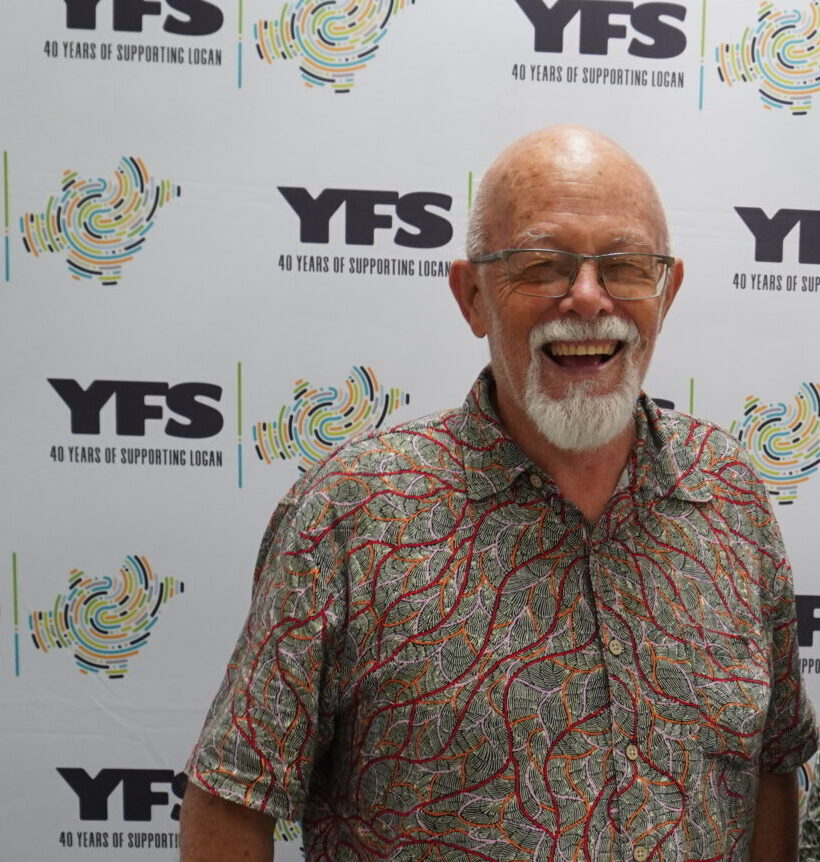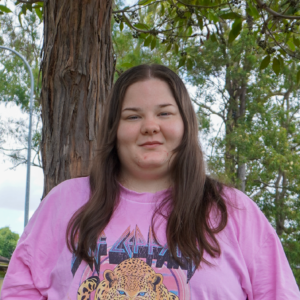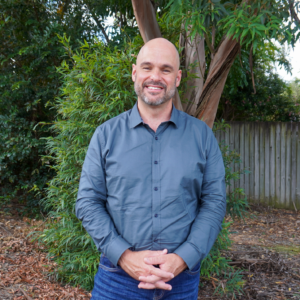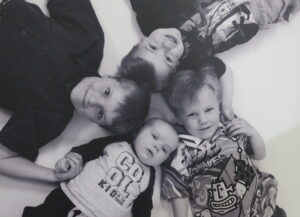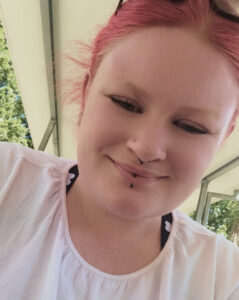In 1983, Mick Devlin was working hard to convince his fellow Christian Brothers (a religious community within the Catholic Church, founded by Edmund Rice) that they should be investing time and resources supporting people in Woodridge – a region which, despite experiencing severe disadvantage, had virtually no community services.
“Originally they wanted to send me to Bracken Ridge, but there were 7,000 people in housing commission there, at the time, and Dominican sisters doing community work. But there were 70,000 in the Woodridge/Kingston area. It didn’t make sense.”
Mick successfully appealed to the Archbishop and was sent, along with three other Christian Brothers, to Logan, where the Brothers leased a house near Kingston Station.
The Woodridge and Kingston parish priests welcomed the Brothers, introducing them to local families who might be interested in joining an informal reference committee. Many of these families, Mick soon learned, had children caught up in the juvenile justice system.
One day, when accompanying a family to the Beenleigh courthouse, Mick was approached by a curious teenager. Once Mick clarified he wasn’t working with police, the young man started sharing his perspective about what was impacting young people in Woodridge – and the kind of help they needed.
“This young man really knew what needed to happen. And as we got to know the families [better], we heard more and more horror stories.”
The Christian Brothers and reference committee began organising volunteer youth workers to go out in pairs, helping young people on the streets. Operating in the days before the Fitzgerald Inquiry (which investigated political and police corruption and organised crime in Queensland) wasn’t easy, and Mick began recording incidents of police violence and other interactions which breached young people’s rights.
Eventually, Mick found a senior policeman who began addressing his complaints. With the officer’s support, the (now growing) reference committee developed an after-hours roster with who volunteered to provide legal advice and support whenever a young person was being held by police — often at night with no parent present.
“They would rock up and ask to do a welfare check and question police about why the young person wasn’t being supported by an appropriate adult.”
The Christian Brothers and other volunteers also began supporting youth at risk of entering the juvenile justice system (and their families) with outdoor adventure camps designed to help them consider new possibilities for their future.
“It used to amaze me that a 15-year-old who could drive a car at 160km per hour couldn’t climb a tree. But as they learnt new skills it grew their confidence, their belief that they were capable of doing hard things.”
Around the same time that the reference committee was gaining momentum, the first Edmund Rice Flexi school, Centre Ed, was established in Kingston (in collaboration with local high schools) for children disengaged from mainstream schools.
“Some members of our reference committee were also on the board there. We did a lot of work together and it was another way we got to know the families of young people in the area.”
As well as supporting young people in the justice and education systems, the reference committee identified housing as a critical issue for the community. In 1985 they began running unfunded residential care, staffed by volunteers, from a house in Atkinson Street. Then, when a Logan Councillor and a local developer offered the fledgling organisation the use of 30 soon-to-be-demolished houses, YFS’ housing services rapidly expanded.
“One of the young people become a lead tenant at a supported accommodation house in Leichhardt Street, helping other young people. This young man went on to manage the Aboriginal and Torres Strait Islander Legal Service in Cairns.”
The YFS houses soon became a go-to point, not only for young people experiencing homelessness, but for parents who also needed support.
“Domestic violence was a big issue for a lot of the parents, and they would come to us with bloodied faces – there were no [domestic and family violence] services except for the Women’s Shelter here then.”
“It was probably the hardest thing for me to deal with – I had a phobia about blood and years later realised I had some childhood trauma, but I didn’t know it at the time.”
Supporting people in such difficult circumstances took a toll, and after four years Mick took a break from community work, leaving the Christian Brothers and beginning a social work degree at the University of Queensland.
Before this break, however, Mick met a First Nations woman who went on to have a profound influence on both his work as a community practitioner and on YFS as an organisation – Marlene Moore.
“I was approached by Marlene, who had tried many times to start youth organisations in the area but was always being stopped by the police. She saw an opportunity to join forces with us and was a significant connection to the Aboriginal community here.”
“Marlene was fantastic and helped me understand what I needed to do differently. She’d say, ‘Listen, Devo, this is what we’re going to do.’ So, we would, and it would work.”
Before leaving the Christian Brothers, Mick became convinced that for YFS to succeed it needed to continue growing from the community, for the community.
“Typically, Christian Brothers would have retained governance and auspiced programs – whereas what we were trying to do was empower the community to be that governing board themself.”
YFS did become community managed and at its first AGM in 1985 several members of the reference committee joined YFS’ first Board.
Although Mick’s initial involvement with YFS ended in 1987, he remained closely connected with the organisation for many years – and friendships he made with people during this period have continued to this day.
“We had so many amazingly generous volunteers in the early days, who interacted with our programs and stepped up until we could get funding – experts in community development and human services who volunteered their time to train others – and parents, teachers, professionals from the community. Everybody contributed their skills.”

